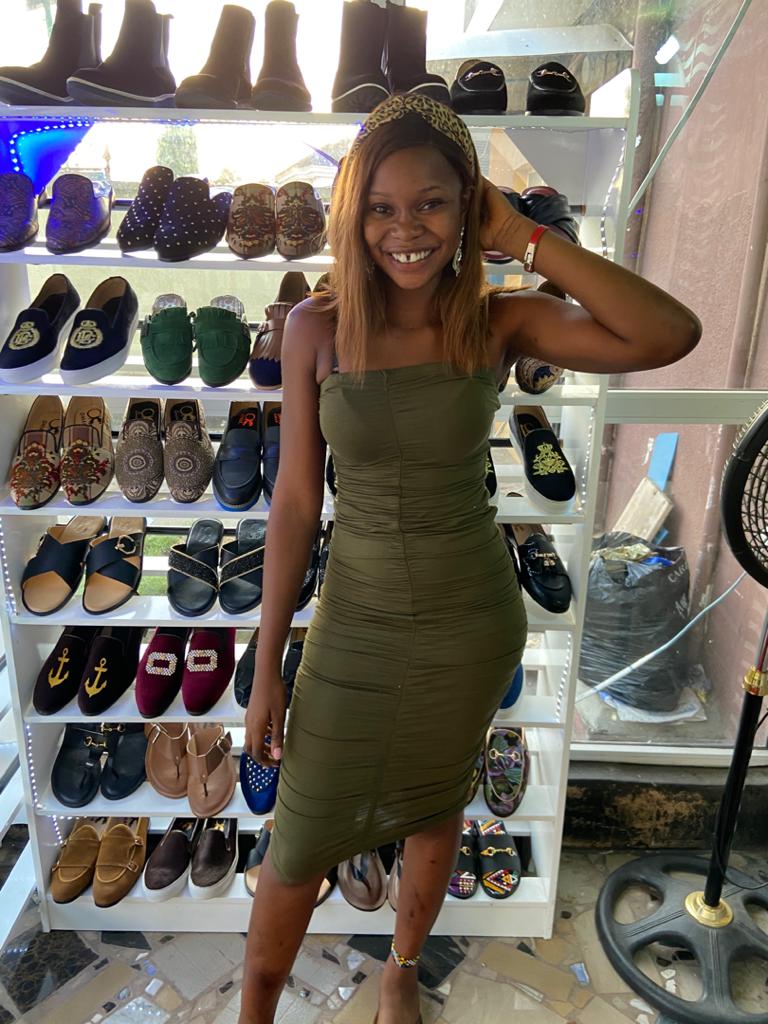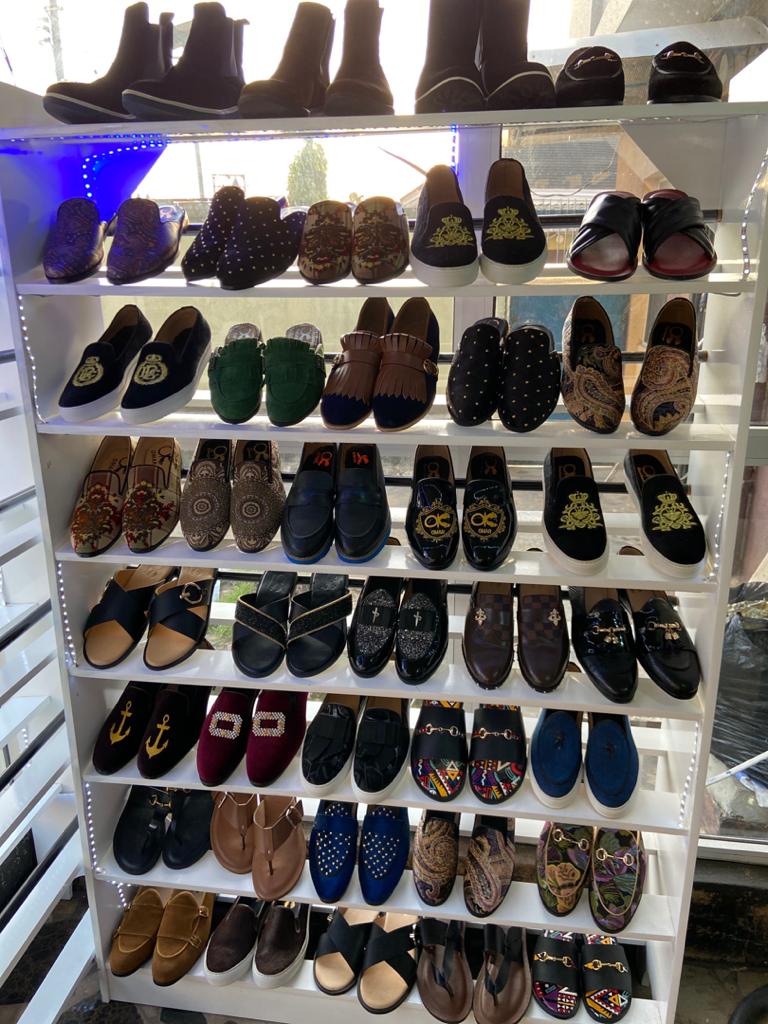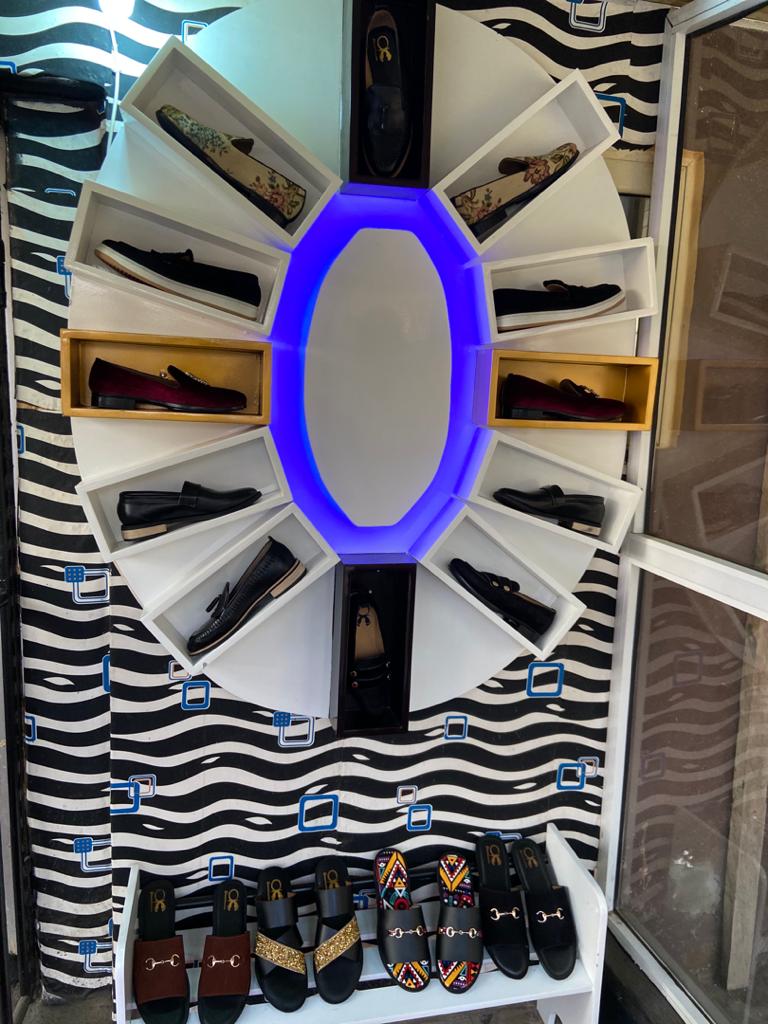Saviour Adugba
- We’re promoting Nigerian brands so people don’t go abroad to buy designer shoes
It is not commonplace to see female shoemakers in Nigeria. In a world where women are continually striving to break the mould and shatter barriers, it was an interesting phenomenon to see a woman who is not just a shoemaker, but a proud owner of a small business shoemaking company, which she says she wants to grow into one of the top brands in Africa and, indeed, the world. OMOTAYO IYANOYE, who owns and runs Omar Collektionz, in this interview with Business A.M.’s SAVIOUR ADUGBA, reflects on her journey to becoming a shoemaker, the hurdles she has faced, and her outlook for the future. Here are excerpts:
For people that might not have met you, who is the shoe goddess?
My name is Omotayo Abosede Iyanoye, popularly known as the Shoe Goddess. My brand, Omar Collektionz, is derived from an acronym of my real names, Omotayo, Abosede and Ruth – OMAR. The Shoe Goddess is a lady in her mid-twenties, a graduate of the Adekunle Ajasin University with a degree in Guidance and Counselling. I graduated with a 2.1 and I am proud to say that (laughs). I love craftsmanship and handiwork, so before I went to university, I learnt how to make hair and I was really good at it but it wasn’t my passion. I only used to make hair for people when I was broke and needed quick money. But then, I stumbled on an old friend of mine, a young person like myself and I saw him display some shoes which he told me that he made himself, to which I expressed disbelief. But he assured me that he was not joking, and took me behind to his warehouse where he was making the shoes. And I saw him making the shoes himself; he even told me that if I had time, he would make a shoe from start to finish in my presence. It was like magic to me, I marvelled at how he took all the parts that looked like pieces and made a proper shoe in my presence. From that point I was awed and promised myself that come what may, I was going to learn shoemaking. I was in my 300 levels back in the university when I had that experience, so I told myself that whenever I went back home for my semester breaks, I would start learning. But, unfortunately, there was not much time in between semesters for me to learn. But every time I saw my friend, I always told him that I was still coming to learn the craft, but he felt at the time, that I was joking. But immediately I graduated from the university and came back home to Lagos, I went to his shop the next day. When he told me the charges involved for me to learn, I was taken aback, even thinking that he was trying to scare me away with the pricing because the amount was enormous to me at the time. But he told that was what was charged for training apprentices in shoemaking. So, I went home, I told people I could tell, but they thought I was joking about learning shoemaking, so nobody paid me attention. So, I had to go into my savings and withdrew everything I had and made part payment to him. He was surprised that I really meant business with my quest to learn shoemaking. That was how I started my journey into shoemaking. I remember that I was the only girl then among the apprentices, but I was really anticipating and looking forward to learning. I “Googled” online and saw some female shoemakers, but most of them were advanced ladies in terms of age. So, I told myself that before I clock 30, I was going to be well-known because of my shoemaking craft and that I will be doing way better than my contemporaries. So, I made a pact with myself that notwithstanding the cost, I was going to learn the shoemaking trade. I was always working and when I got home from work and I was very tired, I’d still take my own materials and start replicating creations I learnt from work. I was also able to save up money and bought a personal sewing machine and I started doing everything from my room. With the machine, when I finished my training at work, I’d go back home and work overnight. At the end of the day, I’d still do rubbish (laughs) because the shoes I was making then, nobody could wear them but I was proud! If I show you my first jobs, you’d laugh at me, but I was really proud of them. So, if I got to work, my boss will laugh at me, then he will correct me. However, I was quite consistent and for me, consistency is key. So, I got better and better by the day, and before you knew, the one year training period had come to an end and I also had to go for my compulsory one year National Youth Service Corp service. For the NYSC scheme, I was posted to Ibadan, so, I had to move my equipment from Lagos to Ibadan and I was working over there, but the patronage was not like it is in Lagos. However, with the little jobs, I was getting to do over at Ibadan, I was getting better but the thing is, in Lagos, I had my boss to run to whenever I was having difficulties with jobs, but in Ibadan, I had nobody to run to. In fact, there were sometimes that while doing a job, I will get so frustrated that I started crying because you spend days and hours to make a pair of shoes and it does not come out well but then, I didn’t stop, I just continued working and working and even injured myself in the process. If I show you old pictures where I had injuries, you will not even be able to stand it. I was really passionate about shoemaking; that’s what kept me going even with the whole troubles and all, I still did not back out. Sometimes I had to try making a shoe over three times before I got it right, but today, no matter where you bring the design from, I can bring that shoe to life.
How did you find your way in a male-dominated industry like shoemaking in Nigeria?
I did my own research and I noticed that people are usually attracted to the opposite sex when they want to make a buying decision. Myself, I prefer to make my hair with male beauticians because I believe that they pay me more attention and generally handle me with more care. So, when people see a lady that makes shoes, it usually attracts them to me. More so, people usually pay better when they are patronising the opposite sex. So the thing is, there are ladies working in every industry even though we are not many. So, I personally did not consider gender too much when I went into shoemaking, I just found out that I had a passion for making shoes. I saw a lot of ladies selling shoes, but I wanted to stand out from them in that I made my shoes by myself and teach people how to make shoes. I also wanted to elevate ladies because I saw quite a number of ladies who wanted to learn shoemaking but most of them withdraw because they don’t feel comfortable learning from a guy. So, now when they see me as a lady making shoes, it gives them better confidence and provides a safe place where they can learn the trade.
How has the journey been for you in terms of business? Have you had any challenges and difficulties?
The number one problem is money. Money is very, very important to start and thrive in this business. Although, I’d say that I have a supportive family, but they weren’t so supportive at the beginning. They thought I was losing it when I told them that I wanted to learn shoemaking, but the truth is that I have overcome those obstacles. Like I said, money was a problem but I resolved that by starting small. I started my business from my room; then I went to Ibadan during my NYSC. After that, I came back to Lagos. I was somewhere else before I moved down here (her shop), and I believe that I am still going to move somewhere better. So, it has been a gradual process for me. It is not as if I had all the money I needed from the beginning, I am very good at saving. Whenever I focus on something, I make sure that I achieve it. Another challenge that I encountered was machine hazards. I have pictures of me getting injured by some of the machines. One memorable injury was when the machine scraped me badly to the extent that my mum started protesting that I must stop making shoes. As a matter of fact, the injury nearly got infected with tetanus but I did not stop, I kept pushing. I remember that I was in a life-threatening accident that left me hospitalised for three months and the doctor said I will not be able to make use of my legs anymore. I was disappointed because I thought I was not going to be able to use the sewing machine again or do the job that I loved anymore. But thankfully, I healed. And immediately I did not depend on my crutches anymore, I went straight to shoemaking, again to the surprise of family and friends.
How do you make yourself stand out from the crowd in a city where there are many shoemakers?
First, I think I stand out because I am a female that is operating in an industry that is otherwise dominated by men. So, when people see my shoes and learn that they were made by a lady, they are usually interested and that helps attract them to me. I also think that my name, the Shoe Goddess also makes me stand out. People are quite attracted to a beautiful lady who has a craft and can handle herself properly.
How have you used technology to scale your business?
I recognise that the world is changing to the point where everything we do now is done online. These days, one does not need to go out or even move an inch before they buy products and get them delivered to the comfort of their homes. So, I use more of social media to scale; I do advert placement to make sure that my products get seen by a wider group of people, and they place orders which I normally process through the logistics companies. I am also looking to conclude my website soon. It will be a platform where people can see our products and place orders directly from there.
So, what is your outlook for the future? Where do you see Shoe Goddess and the Omar Shoes brand going in the next five to 10 years?
In five years’ time, I am seeing myself really big. I look forward to having a minimum of four outlets by that time, and a big factory with world-class machines. We are trying to promote the Nigerian brand where people will not need to go abroad to buy designer shoes when they can get top quality products here. Also, in five years, I see myself producing shoes on a very large scale and also have lots of women that I will carry along on this journey. I want women to start their own shoe businesses and point proudly that they learnt their trade from the Shoe Goddess. Many people actually believe that women don’t want to work; they do but they need to be handled properly and given the right opportunities. So, I really want to run a company where women are given opportunities, although there would be males working there as well; but, we want more of ladies. Additionally, I will like to see Omar Collektionz being stocked at the biggest stores.
Do you see yourself as someone who is breaking barriers in order to create opportunities for more women?
Definitely, I see myself breaking boundaries and if I can do it, why can’t you do it? I will not sit here and lie that I started with one naira, because I did not. I started with money, but the truth is that consistency is what really helped me succeed. And I believe that if I can be consistent, anyone can be consistent.
Lack of access to funding is one of the fundamental issues that people deal with when they are looking to start their own businesses. So, in your own case, how were you able to source for funds to start your business?
When I started, I had little money saved which I used in making a part payment for my training. I also used the stipends that my parents sent me for upkeep to buy materials. So I kept on practising till I got better. Meanwhile, I was posting pictures of my boss’ jobs, and when I got orders, I gave it to him to fulfil. So, while he was creating shoes for the orders received, I usually followed suit although the shoes I created were for practices and not for clients, but I was using that for my practise while making money because my boss used to compensate me for the jobs I brought in. So, I was saving little by little until I got my machine. For people who want to go into other areas, you can do drop shipping. It allows you to start doing business even without capital. And with your little income, you must make sure that you save. So make sure that you don’t spend your profit, reinvest in your business and scale up your funds before going into areas that you are passionate about.
How can people that are interested in your shoes reach out to you?
I can be reached on all social media channels at @omarcollecktionz, and our shop address is at Stella Sholanke Street, opposite Westview Hotel, Airport Road, Ajao Estate, Lagos.











